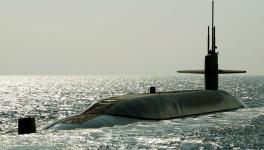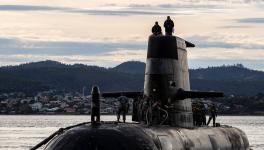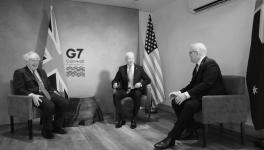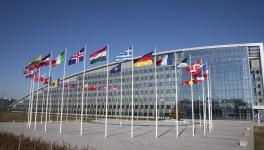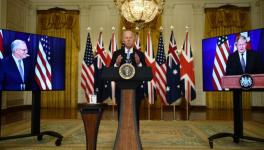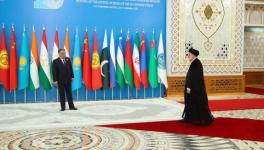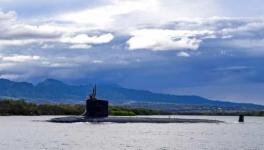US, UK, Australia Launch New Trilateral Indo-Pacific Alliance to Counter China
Image Courtesy: Deccan Herald
Washington/London: The US, UK and Australia have announced a new trilateral security alliance for the Indo-Pacific to take on the threats of the 21st century and allow for greater sharing of defence capabilities, including help Australia acquire nuclear-powered submarines, in an effort to counter China's growing power and military presence in the strategically vital region.
In Beijing, China sharply criticised the US, the UK and Australia’s trilateral military partnership under which Canberra would be assisted to build nuclear-powered submarines for the first time, saying it would closely monitor the pact that will gravely undermine regional stability and aggravate the arms race and hurt international non-proliferation efforts.
Unveiling the ambitious security initiative, US President Joe Biden, UK Prime Minister Boris Johnson and his Australian counterpart Scott Morrison in a joint statement said their move will promote stability in the Indo-Pacific and support of their shared values and interests.
"We are taking another historic step to deepen and formalise cooperation among all three of our nations because we all recognise the imperative of ensuring peace and stability in the Indo-Pacific over the long term," President Biden said at the virtual launch of the new alliance known as AUKUS on Wednesday.
Speaking from the East Room of the White House, Biden said that the three countries will update and enhance their shared ability to take on the threats of the 21st century, just as they did in the 20th century, together.
“The United States, Australia, United Kingdom have long been faithful and capable partners and we're even closer today. Today, we're taking another historic step to deepen and formalise cooperation among all three of our nations because we all recognise the imperative of ensuring peace stability in the Indo-Pacific over the long term,” he said.
Interestingly, the announcement of AUKUS has come a week before a meeting of Quad leaders to be hosted by US President Biden in Washington on September 24. The meeting will also be attended by Prime Minister Narendra Modi, Prime Minister of Australia Morrison and Japanese Prime Minister Yoshihide Suga.
Under the AUKUS alliance, the three nations have agreed to enhance the development of joint capabilities and technology sharing, foster deeper integration of security and defence-related science, technology, industrial bases and supply chains.
Under the first major initiative of AUKUS, Australia would build a fleet of nuclear-powered submarines with the help of the US and the UK, a capability aimed at promoting stability in the Indo-Pacific region.
“The UK, Australia and US are natural allies – while we may be separated geographically, our interests and values are shared,” said British Prime Minister Boris Johnson, who joined from Downing Street in London for the virtual address before a joint statement was released.
“The AUKUS alliance will bring us closer than ever, creating a new defence partnership and driving jobs and prosperity. This partnership will become increasingly vital for defending our interests in the Indo-Pacific region and, by extension, protecting our people back at home,” he said.
Johnson said the aim of the new partnership was working hand in glove and to preserve security and stability in the Indo-Pacific.
“We're opening a new chapter in our friendship. And the first task of this partnership will be to help Australia acquire a fleet of nuclear-powered submarines.
"Emphasising, of course, that the submarines in question will be powered by nuclear reactors not armed with nuclear weapons. And our work will be fully in line with our non-proliferation obligations,” he said.
All three leaders insisted that the submarines would be nuclear-powered and the effort is geared towards ensuring peace in the Indo-Pacific region.
”AUKUS will enhance our contribution to our growing network of partnerships in the Indo-Pacific region. …our ASEAN friends, our bilateral strategic partners, the Quad, Five Eyes countries, and of course our dear Pacific family. The first major initiative of AUKUS will be to deliver a nuclear-powered submarine fleet for Australia,” Australian Prime Minister Morrison said.
Over the next 18 months, the three countries will work together to seek to determine the best way forward to achieve this, he said.
“This will include an intense examination of what we need to do to exercise our nuclear stewardship responsibilities here in Australia. We intend to build these submarines in Adelaide, Australia in close cooperation with the United Kingdom and the United States,” he said.
Australia is not seeking to acquire nuclear weapons or establish a civil nuclear capability, Morrison asserted, adding that the US will continue to meet all its nuclear non-proliferation obligations.
President Biden said AUKUS will bring together sailors, scientists, and industries to maintain and expand their edge and military capabilities and critical technologies such as cyber, artificial intelligence, quantum technologies, and undersea domains.
“Now, as a key project, under AUKUS, we are launching consultations with Australia's acquisition of conventionally armed, nuclear-powered submarines for its navy,” he said.
“Conventionally armed. I want to be exceedingly clear about this. We're not talking about nuclear-armed submarines. These are conventionally armed submarines that are powered by nuclear reactors. This technology is proven, it's safe, and the United States and the UK have been operating nuclear-powered submarines for decades,” Biden said.
The agreement reflects the unique level of trust and cooperation between our three countries, who already share extensive intelligence through the Five Eyes alliance, Downing Street said.
“Recognising our deep defence ties, built over decades, today we also embark on further trilateral collaboration under AUKUS to enhance our joint capabilities and interoperability. These initial efforts will focus on cyber capabilities, artificial intelligence, quantum technologies, and additional undersea capabilities,” reads the joint statement issued by the leaders.
“Through AUKUS, our governments will strengthen the ability of each to support our security and defence interests, building on our longstanding and ongoing bilateral ties.
“We will promote deeper information and technology sharing. We will foster deeper integration of security and defence-related science, technology, industrial bases, and supply chains. And in particular, we will significantly deepen cooperation on a range of security and defence capabilities,” it adds.
The leaders said their new endeavour is aimed at helping sustain peace and stability in the Indo-Pacific region.
The initial scoping phase for the new alliance is expected to take 18 months. The UK said that as it has built and operated world-class nuclear-powered submarines for over 60 years, it will bring "deep expertise and experience" to the first project under AUKUS.
The UK and US, already leading members of NATO defence alliance, said the work done by AUKUS will support shared goals in new regions, promoting stability and protecting “our people against new and emerging threats”.
Highlighting this growing Indo-Pacific tilt, the UK government pointed to HMS Queen Elizabeth aircraft carrier’s deployment to the region alongside personnel and equipment from the US.
Last month, the Carrier Strike Group undertook a series of exercises with countries, including India and Australia, to build “interoperability with like-minded partners”, it said.
At the September 24 Quad summit, Biden, Modi, Morrison and Suga would discuss promoting a free and open Indo-Pacific, addressing the climate crisis and deepening their ties and advancing practical cooperation on areas like combatting COVID-19, White House Press Secretary Jen Psaki said on Monday.
The evolving situation in the Indo-Pacific region in the wake of China's increasing military muscle-flexing has become a major talking point among leading global powers. The US has been favouring making Quad a security architecture to check China's growing assertiveness.
Biden has made countering China a central aspect of his foreign policy as tensions grow over the South China Sea and Taiwan, and has said he wants American allies on board.
Beijing claims almost all of the 1.3 million square mile South China Sea as its sovereign territory. China has been building military bases on artificial islands in the region also claimed by Brunei, Malaysia, the Philippines, Taiwan and Vietnam.
China has built up and militarised many of the islands and reefs it controls in the region. Both maritime areas in the South and East China seas are stated to be rich in minerals, oil and other natural resources and are also vital to global trade.
AUKUS Will Aggravate Arms Race: China
In Beijing, the remarks of Chinese Foreign Ministry spokesman Zhao Lijian came after the US, the UK and Australia announced a new trilateral security alliance for the Indo-Pacific to take on the threats of the 21st century and allow for greater sharing of defence capabilities, including help Australia acquire nuclear-powered submarines.
Under the historic pact -- seen as an effort to counter China's growing power and military presence in the strategically vital region -- Australia will be assisted to build nuclear-powered submarines for the first time, using American technology.
Zhao, when asked for his reaction to the trilateral defence pact, said: “The US, the UK and Australia are engaging in a cooperation in nuclear powered submarines that gravely undermines regional peace and stability, aggravate arms race and hurts the international non-proliferation efforts”.
“The US and UK are about to export highly-sensitive nuclear powered submarine technology to Australia. This once again shows that they are using nuclear exports for geopolitical gaming tools and applying double standards which is extremely irresponsible.
“Australia is a non-nuclear weapons state, party to the NPT (Treaty on the Non-Proliferation of Nuclear Weapons) and a party to the nuclear weapon free zone in the southern pacific. Now it is importing nuclear powered submarine technology which is of strategic military value,” Zhao told a media briefing here.
The international community, including the neighbouring countries, have raised questions on its commitment to nuclear non-perforation, he said.
“China will closely monitor the situation. China always believes that any regional mechanism must go with the trend of the times for peace and development and should be conducive to mutual trust and cooperation between the regional countries. They should not target any third party or harm third party’s interests.
“To form an exclusive and closed clique or small group goes against the trend of the times and the aspiration of regional countries,” Zhao said, adding that such grouping has no future.
The relevant countries should abandon the obsolete Cold War zero-sum mentality and narrow-minded geopolitical concept, respect regional people’s aspirations and do more things conducive to regional peace, stability and development. Otherwise, they will end up hurting their own interests, the Chinese Foreign Ministry spokesman added.
Get the latest reports & analysis with people's perspective on Protests, movements & deep analytical videos, discussions of the current affairs in your Telegram app. Subscribe to NewsClick's Telegram channel & get Real-Time updates on stories, as they get published on our website.










